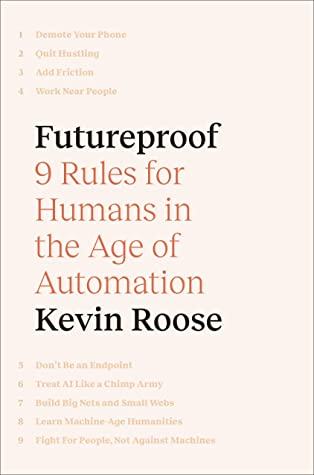Futureproof: 9 Rules for Humans in the Age of Automation by Kevin Roose

My Rating of “Futureproof: 9 Rules for Humans in the Age of Automation” by Kevin Roose: 8 / 10

We are all aware of the incessant wave of technology optimising business and automating the simple things we do each and every day. The stories on the demise of the human factor in productivity and operations in the coming decades are never ending. Most of the news press is doom and gloom however Kevin Roose writes with a potential approach. The questions he is answering is how we stay relevant in the digital world?
The book is broken down into two section. The first deals with the history. For example, how technology has created a path for itself to eliminate the need and usefulness of human labour. Most will cite this technological history using the four industry revolutions (Wikipedia). Roose also dispels the true definition and scope of artificial intelligence and how it learns (and develops its own bias). The latter is of concern as the use of AI has been more of a capitalist pursuit versus for the greater good.
More importantly is the second section of this book (e.g. the rules). Roose outlines how we humans can stay relevant in the age of machines. We must embody the persona of the surprising, social and scarce resource. He puts particular emphasis on the concept of resisting machine drift. That is to not let machines take advantage of your predictability. The other rules focus on leaving handprints, not being an endpoint and learning machine-age humanities.
Futureproof is an important book for the survival of the human workforce. We all must ensure relevance in the coming decades. Yes the younger generation may be more computer literate. Yet they are ignorant of the impact technology can have on their future livelihoods
Three key takeaways from the book:
- We need to be more worried about who is designing and implementing this new technology than the technology itself.
- Researchers have found that, after reaching a certain performance threshold, AI tends to outperform not only humans, but human-AI teams.
- Whether you think AI and automation will be great or terrible for humanity, it’s important to remember that none of this is predetermined. Executives, not algorithms, decide whether to replace human workers. Regulators, not robots, decide what limits to place on emerging technologies like facial recognition and targeted digital advertising. The engineers building new forms of AI have a say in how those tools are designed, and users can decide whether these tools are morally acceptable or not. This is the truth about the AI revolution. There is no looming machine takeover, no army of malevolent robots plotting to rise up and enslave us. It’s just people, deciding what kind of society we want.




